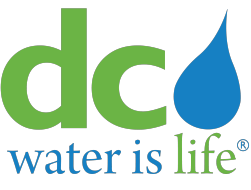2008 Marks Blue Plains 70th Anniversary and the International Year of Sanitation
The United Nations has declared 2008 the International Year of Sanitation. It seems fitting that Blue Plains Advanced Wastewater Treatment Plant celebrates its 70th anniversary this year.
According to the United Nations web site, around the world 2.6 billion people do not have access to that basic necessity a toilet. Here in the nations capital, not many people think twice about the availability of a clean, safe bathroom. But it wasnt always that way.
The Districts sewer system began around 1810, when culverts drained stormwater and ground water from the streets. These culverts were not connected into a city-wide system as they are today. Prior to this primitive system, wastewater was dumped into waterways, in the environment, and even illegally in the streets. But with increased population, these unsanitary conditions led to epidemics of smallpox, typhoid and malaria that killed thousands of people. The Federal Government stepped in to develop a city-wide sewer system. The commencement of this program was heralded for its advancements in public health and quality of life.
A Board of Engineers recommended that all the sewage flows be discharged at a point far enough down the Potomac River to prevent their return to the city. Hence, Blue Plains became the discharge point and a treatment facility was planned.
Wastewater treatment plants use primary, secondary, and advanced to indicate the level of treatment provided by each process. Primary treatment is the basic stage, secondary treatment is the process by which bacteria absorb or feed on organic solids which will not settle, and advanced treatment is any treatment that improves the effluent quality of a secondary process. Advanced treatment processes remove phosphorous and nitrogen, which affect river quality.
When it opened on August 1, 1938, Blue Plains was a primary treatment facility designed to serve a population of 650,000. In 1959, the plant was expanded to accommodate secondary treatment and increased capacity. By 1969, Blue Plains needed another facility upgrade. The District Government, with authorities from Maryland and Virginia, agreed to expand the facility to increase its ability to meet the Federal Clean Water Act, mandated at that time.
Blue Plains was modernized and expanded to become an advanced wastewater treatment facility, processing more that 300 million gallons per day. Today, it is the largest advanced wastewater treatment plant in the world and is a destination for many international study tour groups, who seek information on best practices in developing wastewater systems.
Though wastewater systems and treatment plants were once praised for the sanitation and health improvements they provide, they now are often cited for polluted waterways. Its a delicate balance. DC WASA continues to invest in research, technology, facility upgrades and public education to lessen the impact on the environment while providing a service that 2.6 billion people in the world are lacking.
Sources:
http://esa.un.org/iys/background.shtml
http://www.dcwasa.com/about/history.cfm#blueplains






